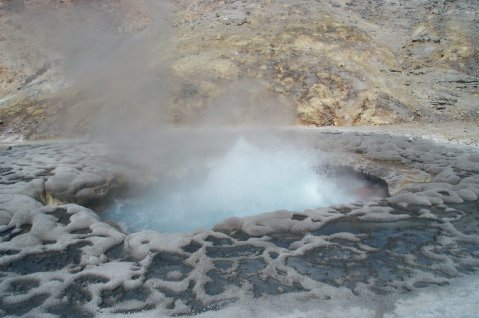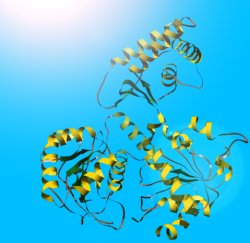Volcanic bug aids ‘Children of the Moon’

Scientists probing an ancient microbe have shed new light on a rare condition that causes acute sensitivity to the sun.
The researchers at the University of St Andrews investigated the microbe – found in hot volcanic pools – for clues relevant to human disease and cancer. The team’s finding offers remarkable insights into the puzzling question of why some gene mutations cause cancer whilst others lead to premature ageing.
The St Andrews team, led by Professors Malcolm White and James Naismith at the University’s Centre for Biomolecular Sciences (CBMS), hope that the study may lead to better understanding of the debilitating genetic condition XP (xeroderma pigmentosum). XP patients – often referred to as `Children of the Moon’ – cannot be exposed to normal sunlight and suffer an exceptionally high risk of developing skin cancer.
 XP and other diseases are caused by mutations in the XPD protein, a crucial DNA repair enzyme that normally protects us against the damaging effects of UV radiation in sunlight. Other mutations in XPD cause genetic diseases such as Cockayne syndrome and Trichothiodystrophy (TTD) that can lead to accelerated premature ageing in children.
XP and other diseases are caused by mutations in the XPD protein, a crucial DNA repair enzyme that normally protects us against the damaging effects of UV radiation in sunlight. Other mutations in XPD cause genetic diseases such as Cockayne syndrome and Trichothiodystrophy (TTD) that can lead to accelerated premature ageing in children.
The St Andrews’ breakthrough lies in the solving of the molecular structure of the XPD protein, which will help researchers understand the mechanisms behind such mutations. At the heart of the discovery is the use of the ancient microbe, which makes an excellent model for the human protein since its structure has been conserved through three billion years of evolution.
Professor White explained, “A combination of structural and molecular biology has allowed us to probe this fascinating enzyme. This ancient lineage of microbes has interesting similarities to humans, in the way in which they process information. This includes DNA replication, transcription and repair. The structures are often very close matches to the equivalent proteins from humans, even though they diverged from one another 3 billion years ago.
“Thanks to this discovery we can now appreciate why some mutations cause cancer whilst others lead to premature ageing. The reasons why some XPD mutations cause XP and others TTD have been unclear, but have been thought to relate to defects in repair. This has always been a puzzle, but the links between cancer and ageing are becoming an important focus for research.”
The work was funded by Cancer Research UK, Biotechnology and Biological Sciences Research Council (BBSRC), Scottish Funding Council and the University of St Andrews, and builds on previous work funded by the St Andrews-based charity Association for International Cancer Research (AICR).
Professor Naismith commented, “This work is a technical tour-de-force, and would have been impossible without the team work and facilities present at the Scottish Structural Proteomics Facility at St Andrews. The discovery will help in our understanding of the basic principles behind DNA repair and genetic conditions such as XP. By solving the structure of the XPD protein, it allows us to understand how the different diseases exert their very different effects at a molecular level.
“It is possible that this information will aid in the development on new anti-cancer drugs in the future, although that is likely to be many years away.”
The research is published in the journal Cell today (30th May 2008).
ENDS
NOTE TO EDITORS:
THE RESEARCHERS ARE AVAILABLE FOR INTERVIEW:
PROFESSOR MALCOLM WHITE – Tel: 01334 463432, email [email protected]
PROFESSOR JAMES NAISMITH – Tel: 01334 463792, email [email protected]
Further scientific background
The team in St Andrews solved the three dimensional structure of the XPD protein from an organism called Sulfolobus tokadaii (Sto). Sto is a member of the archaea family, an ancient lineage of microbes that has interesting similarities to humans in the way in which they process information.
Issued by the Press Office, University of St Andrews
Contact Gayle Cook, Press Officer on 01334 467227 / 462529, mobile 07900 050 103, or email [email protected]
Ref: Children of the Moon 300508
View the latest University press releases at www.st-andrews.ac.uk
Category Research